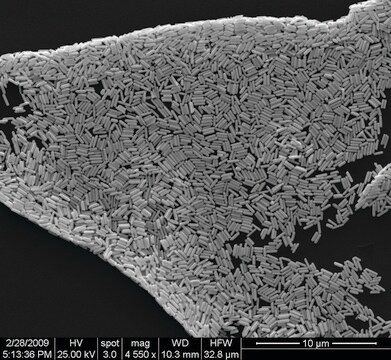771651
Gold nanorods
25 nm diameter, λmax, 600 nm, dispersion in H2O
Synonym(s):
Au nanorods, Gold nanorod
About This Item
Recommended Products
form
colloidal suspension
dispersion in H2O
nanorod
contains
CTAB as stabilizer
concentration
>45 μg/mL in H2O
diam. × L
25 nm × 47 nm (±10%)
diameter
25 nm
λmax
600 nm
Mw/Mn
>95 (rods)
storage temp.
2-8°C
InChI
1S/Au
InChI key
PCHJSUWPFVWCPO-UHFFFAOYSA-N
Looking for similar products? Visit Product Comparison Guide
General description
Application
Features and Benefits
Legal Information
Hazard Statements
Precautionary Statements
Hazard Classifications
Aquatic Chronic 3
Storage Class Code
12 - Non Combustible Liquids
WGK
WGK 3
Flash Point(F)
Not applicable
Flash Point(C)
Not applicable
Choose from one of the most recent versions:
Certificates of Analysis (COA)
Don't see the Right Version?
If you require a particular version, you can look up a specific certificate by the Lot or Batch number.
Already Own This Product?
Find documentation for the products that you have recently purchased in the Document Library.
Articles
Silver nanomaterials have unique physical, chemical, and optical properties that are currently being leveraged for a wide variety of biological applications.
In many technologies, performance requirements drive device dimensions below the scale of electron mean free paths (λe). This trend has increased scientific interest and technological importance of electrical resistivities at the nanoscale.
Inorganic nanomaterials are tunable by size, shape, structure, and/or composition. Advances in the synthesis of well-defined nanomaterials have enabled control over their unique optical, electronic, and chemical properties stimulating tremendous interest across a wide range of disciplines. This article illuminates some of the recent research advances of inorganic nanoparticles (NPs) in optoelectronics applications.
Our team of scientists has experience in all areas of research including Life Science, Material Science, Chemical Synthesis, Chromatography, Analytical and many others.
Contact Technical Service




